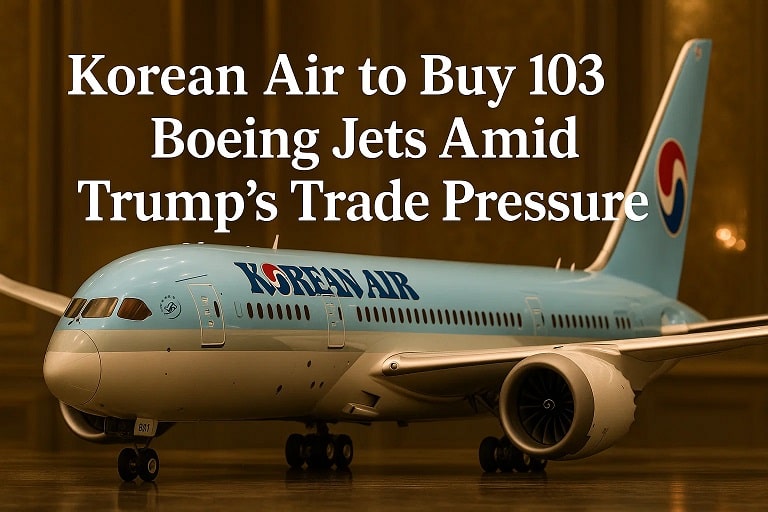Korean Air to Buy 103 Boeing Jets Amid Trump’s Trade Pressure: A Strategic Move
By Editorial Desk | August 26, 2025
Korean Air announced a historic $50 billion deal on August 25, 2025, to purchase 103 Boeing aircraft and secure engine maintenance from GE Aerospace, marking the largest aircraft order in South Korea’s history. The agreement, unveiled during a Washington summit between South Korean President Lee Jae Myung and U.S. President Donald Trump, reflects Trump’s aggressive push for trading partners to boost American business amid 15% U.S. tariffs imposed on South Korea in July 2025. The deal, which includes Boeing 777s, 787s, 737s, and 777-8F freighters, supports Korean Air’s fleet modernization and merger with Asiana Airlines while aligning with U.S. trade objectives. This article explores the deal’s details, its geopolitical context, and its broader implications, with analysis, tables, and FAQs.
Overview of the Korean Air-Boeing Deal
The $50 billion agreement, formalized at a Washington signing ceremony, encompasses $36.2 billion for 103 Boeing aircraft, $690 million for 19 spare engines from GE Aerospace and CFM International, and $13 billion for a 20-year engine maintenance contract with GE Aerospace. The order includes 20 Boeing 777-9s, 25 Boeing 787-10s, 50 Boeing 737-10s, and eight Boeing 777-8F freighters, with deliveries phased through 2030. The deal, attended by Korean Air Chairman Walter Cho, Boeing’s Stephanie Pope, and U.S. Commerce Secretary Howard Lutnick, is expected to support 135,000 U.S. jobs and strengthen Korea-U.S. economic ties. It follows Korean Air’s earlier 2025 order for up to 50 Boeing planes, bringing its total Boeing commitments this year to over 150 aircraft.
Trump’s Trade Strategy and Boeing’s Recovery
Since taking office, President Trump has prioritized an “America First” trade policy, imposing tariffs—15% on South Korea, 50% on India—and pressuring allies to increase U.S. purchases to balance trade deficits. This strategy has secured nearly 1,000 Boeing aircraft orders from countries like Japan, Qatar, and Indonesia in 2025, totaling an estimated $457 billion. Boeing, recovering from a 2024 crisis involving a 737 MAX incident and a 40% stock drop, has seen a 70% stock rebound to $271 by August 25, 2025, fueled by these deals. Korean Air’s order aligns with its $1.3 billion acquisition of Asiana Airlines, finalized in December 2024, aiming to create a unified, competitive carrier by 2027.
Detailed Breakdown of the Deal
Deal Components
- Aircraft Purchase: $36.2 billion for 103 Boeing jets (20 777-9s, 25 787-10s, 50 737-10s, 8 777-8F freighters).
- Engine Purchase: $690 million for 19 spare engines from GE Aerospace and CFM International.
- Maintenance Contract: $13 billion for 20-year engine servicing with GE Aerospace.
- Delivery Schedule: Phased through 2030, supporting fleet modernization and Asiana integration.
Strategic Objectives
- Korean Air: Modernize fleet with fuel-efficient jets (20% emissions reduction for 777-9s), enhance passenger experience, and prepare for Asiana merger.
- Boeing: Bolster $600 billion order backlog, recover from 2024 setbacks, and leverage Trump’s trade push.
- U.S. Trade Policy: Reduce trade deficits, with South Korea’s $150 billion shipbuilding pledge and Hyundai’s $26 billion U.S. investment complementing the deal.
Key Stakeholders
- Walter Cho: Korean Air Chairman, emphasizing global competitiveness.
- Stephanie Pope: Boeing Commercial Airplanes CEO, calling it a “landmark agreement.”
- Howard Lutnick: U.S. Commerce Secretary, highlighting 135,000 U.S. jobs supported.
- Lee Jae Myung: South Korean President, aligning with Trump’s trade expectations.
Trends and Implications
Strategic Rationale
The deal reflects Trump’s “aircraft sales diplomacy,” using Boeing orders to strengthen U.S. economic ties and counter tariff threats. For Korean Air, the purchase ensures operational efficiency and competitiveness amid a $70 trillion investment plan through the 2030s. South Korea’s strategic timing during Lee’s Washington visit signals a diplomatic gesture to mitigate U.S. tariffs, which cost South Korea $10 billion annually.
Economic and Industry Impacts
- Job Creation: Supports 135,000 U.S. jobs, per Boeing, boosting manufacturing in states like Washington and Illinois.
- Market Reaction: Boeing’s stock rose 2% in after-hours trading on August 25, 2025, reaching $271.
- Trade Balance: Reduces U.S.-South Korea trade deficit, with South Korea exporting $181 billion to China but investing heavily in U.S. markets.
- Aviation Sector: Enhances Korean Air’s fleet, which includes 108 Boeing and 56 Airbus A321neo aircraft, positioning it against rivals like Qatar Airways.
Challenges
- Boeing’s Production Issues: A backlog of 5,900 aircraft and a strike by 3,200 workers in Missouri and Illinois since August 2025 risk delays.
- Tariff Pressures: South Korea’s $350 billion Wall Street investments and $1.1 billion for U.S. troops strain its economy, per X posts.
- Geopolitical Risks: U.S.-China tensions and potential Chinese retaliation could disrupt Boeing’s $500 billion China market.
- Contract Fragility: Some deals, including parts of Korean Air’s, are MOUs with weak legal binding.
Future Projections
The deal cements Korean Air’s Boeing backlog at 175 aircraft, supporting its growth as a unified carrier post-Asiana merger by 2027. Boeing’s order surge could push its market share closer to Airbus, which has gained ground in Asia. Trump’s trade strategy may secure a 500-jet China deal by 2026, but production constraints and labor disputes could hinder delivery timelines. South Korea’s broader investments, including Hyundai’s $5 billion U.S. robot plant, suggest a sustained economic alignment with the U.S. through 2030.
Korean Air-Boeing Deal Snapshot (2025)
|
Component |
Value |
Details |
|---|---|---|
|
Aircraft Purchase |
$36.2B |
103 jets (777-9, 787-10, 737-10, 777-8F) |
|
Engine Purchase |
$690M |
19 spare engines from GE/CFM |
|
Maintenance Contract |
$13B |
20-year GE Aerospace servicing |
|
Total Value |
$50B |
Largest in Korean Air’s history |
|
U.S. Jobs Supported |
135,000 |
Across manufacturing states |
Boeing’s Global Orders Under Trump’s Trade Push (2025)
|
Country |
Aircraft Ordered |
Value (Est.) |
Details |
|---|---|---|---|
|
South Korea |
103 |
$36.2B |
Korean Air’s 777s, 787s, 737s |
|
Qatar |
210 |
$96B |
Qatar Airways’ 787s, 777s |
|
Japan |
100 |
$40B |
Various carriers, per White House |
|
Indonesia |
50 |
$10B |
Garuda Indonesia, under negotiation |
|
China |
500 (pending) |
$200B |
Potential deal by 2026 |
FAQs
What is the Korean Air-Boeing deal?
Korean Air signed a $50 billion deal for 103 Boeing aircraft, 19 spare engines, and 20-year maintenance, announced on August 25, 2025.
Why did Korean Air place this order?
To modernize its fleet, support the Asiana merger, and align with U.S. trade demands amid Trump’s 15% tariffs on South Korea.
What aircraft are included?
20 Boeing 777-9s, 25 787-10s, 50 737-10s, and eight 777-8F freighters, with deliveries through 2030.
How does Trump’s trade pressure factor in?
Trump’s “America First” policy pushes allies to buy U.S. goods, securing nearly 1,000 Boeing orders in 2025 to reduce trade deficits.
What is the economic impact?
The deal supports 135,000 U.S. jobs and boosts Boeing’s stock by 2%, while enhancing South Korea’s aviation competitiveness.
What role does GE Aerospace play?
GE provides $690 million in engines and a $13 billion maintenance contract, ensuring long-term fleet reliability.
Are there risks to the deal?
Boeing’s 5,900-aircraft backlog, a worker strike, and non-binding MOUs could delay delivery or alter terms.
How does this fit Boeing’s broader recovery?
It follows a 70% stock rebound from 2024 lows, driven by orders from Qatar, Japan, and Indonesia.
What’s next for Korean Air?
Fleet modernization and Asiana integration by 2027, with a 175-aircraft Boeing backlog.
How does this impact U.S.-South Korea relations?
Strengthens economic ties, with South Korea’s $150 billion shipbuilding and $26 billion Hyundai investments complementing the deal.
Sources: Reuters, The Independent, BBC News, Yonhap, Benzinga, The New York Times, ChosunBiz, U.S. Department of Commerce; X posts

















